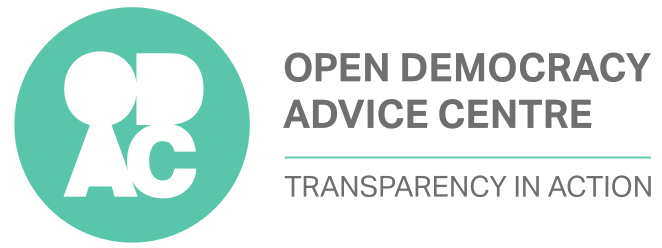Advocacy
The PAIA Unit embarks on a campaign to create awareness of the right of access to information nationally, and has noted a need to accelerate compliance on PAIA at provincial and local government levels. The key objectives of ODAC’s advocacy work are to:
-
Enhance civil society access to public & private information through the Promotion of Access to Information Act (PAIA).
-
Enhance capacity of holders of information to realise effectively the right to access information through the operation of PAIA and PAJA.
-
Support effective implementation of the Promotion of Access to Information Act, the Promotion of Administrative Justice Act.
-
Support the implementing and monitoring agencies in the performance of their statutory responsibilities under both laws through replication of international best practices and benchmarks.
Project 1: National Information Officers Forum - The forum creates a platform whereby implementers of PAIA engage and discuss strategies of increasing compliance rates of the Act. As a result of the , ODAC in conjunction with the SAHRC invites Information Officers and Deputy Information Officers on the Right to Know Day (28TH September) each year to interact with experts and share best practices. The forum has been used as a tool to cultivate a culture of social justice and respect of human rights. At the end of the Forum, the Golden Key Awards ceremony takes place. The ceremony celebrates institutions that have scored well in our Access to Information implementation index research. Provincial Information Officers Forums have also been launched in 2010. The Provincial Forums have been established in KwaZulu-Natal and the North West to identify common challenges affecting the implementation of PAIA. We will be rolling out this project in other provinces. Project 2: Study tour to Sweden Purpose of Study ODAC undertook a study trip for government officials to meet up with their counterparts in Sweden. The trips mission was for the South African delegation to learn about Access to Information and Records Management practices by the Swedish government. Issues discussed included
-
Understanding the difference between information meant for release to the public and privately held information.
-
The importance of the Freedom of the Press Act (Sweden) in granting information
-
How to preserve information and documents.
-
The Secrecy Act used by public officials in Sweden to refuse the release of information.
-
Protection of classified information and how the appeal process work.
-
The principles governing public access to official documents and public restrictions.
-
How the County Council( Equivalent of local municipality) shares information that is of concern to the public
The delegation from South Africa:
-
Mr. Mashwahle Diphofa – (Director General at the Public Service Communion
-
Adv. Ernest Chipu (Chair of the Co-ordinating Committee for the National Information Officers Forum )
-
Mrs. Regina Makhuvele – Director of Records Management at the Limpopo Premiers Office
-
Ms. Zukiswa Mlandu – Officer at the Office of the President of South Africa
-
Adv Mark Serfontein (Deputy Director General at the KZN Premiers Office)
-
Prof. Richard Calland (UCT)
-
Ms. Alison Tilley – Executive Director of ODAC
-
Ms. Gabriella Razzano – South African History Archives
-
Mr. Tobela Tapula – Advocacy Officer at ODAC
